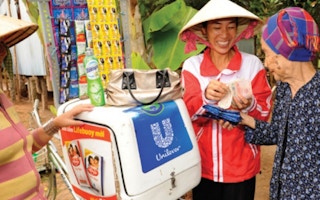Consumer goods maker Unilever says its brands that most fully embrace its CEO’s passion for sustainability perform the best, adding fuel to its oft-repeated argument that social responsibility is good for business.
Of the more than 400 brands Unilever sells, those with the strongest sustainability credentials — such as Dove, Lifebuoy, Ben & Jerry’s and Comfort — have seen sales grow at a high single-digit or double-digit rate over the past three years, Unilever said on Tuesday.
The company doesn’t normally break out sales for individual brands.
“These brands accounted for half the company’s growth in 2014 and grew at twice the rate of the rest of the business,” said Unilever CEO Paul Polman in a statement. Consumers are “increasingly demanding responsible business and responsible brands”.
Polman is known throughout the business world for his commitment to socially responsible causes like fighting climate change and poverty, even as Unilever’s sales have slowed under the weight of a weak margarine business and upheaval in emerging market economies.
As a whole, Unilever saw “underlying sales” grow 6.9 per cent in 2012, 4.3 per cent in 2013 and 2.9 per cent in 2014, as economies in Brazil, China and elsewhere decelerated and many European markets stagnated.
On the cost side, Unilever said it has saved over 400 million euros through eco-friendly measures taken at its factories since 2008. In addition, it made over 200 million euros of savings last year through manufacturing, logistics and other areas related to its “Sustainable Living Plan”.
The company said it was on track to meet most of the goals set out in 2010 under that plan. For example, more than 55 per cent of its agricultural raw materials are now sourced sustainably, making it more than halfway to its 2020 target for 100 per cent.










